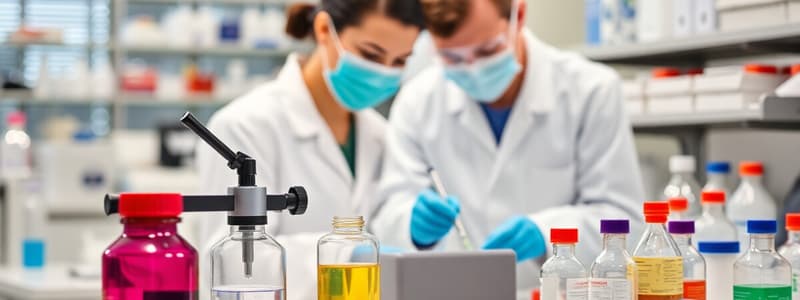Podcast
Questions and Answers
What is the primary purpose of establishing international laboratory standards?
What is the primary purpose of establishing international laboratory standards?
The primary purpose is to ensure quality management by assessing and measuring performance against a standard.
What are the two specific ISO standards that apply to laboratories?
What are the two specific ISO standards that apply to laboratories?
ISO 15189:2007 and ISO/IEC 17025:2005.
How does the Clinical and Laboratory Standards Institute (CLSI) develop its standards?
How does the Clinical and Laboratory Standards Institute (CLSI) develop its standards?
CLSI develops its standards through a consensus process involving various stakeholders.
What is the significance of the ISO 9000 documents in the context of laboratory standards?
What is the significance of the ISO 9000 documents in the context of laboratory standards?
Name one key document published by CLSI that supports quality management in laboratories.
Name one key document published by CLSI that supports quality management in laboratories.
What overarching model does the CLSI quality management system model align with?
What overarching model does the CLSI quality management system model align with?
What role did the U.S. military play in the formation of international laboratory standards?
What role did the U.S. military play in the formation of international laboratory standards?
Why might some countries establish national laboratory quality standards?
Why might some countries establish national laboratory quality standards?
Flashcards are hidden until you start studying
Study Notes
Need for International Laboratory Standards
- Implementation of quality management requires assessing and measuring performance against established benchmarks.
- Development of standards has been led by industries, crucial for consistency and quality in laboratory practices.
Important Laboratory Standards Organizations
-
International Organization for Standardization (ISO):
- Established standards for industrial manufacturing initially based on U.S. military standards.
- ISO 9000: Guidance for quality management applicable across various organizations, including laboratories.
- ISO 15189:2007: Specific requirements for quality and competence in medical laboratories.
- ISO/IEC 17025:2005: General requirements focusing on the competence of testing and calibration laboratories.
-
Clinical and Laboratory Standards Institute (CLSI):
- Formerly National Committee for Clinical Laboratory Standards (NCCLS).
- Utilizes a consensus process to develop laboratory standards involving multiple stakeholders.
- Has created a quality management system model compatible with ISO standards.
Key CLSI Documents
- CLSI/NCCLS A Quality Management System Model for Health Care: Guidelines aimed at enhancing quality management in healthcare settings.
- CLSI/NCCLS Application of a Quality Management System Model for Laboratory Services: Offers guidance on implementing quality management in laboratory services.
Other Standards and Considerations
- Various other standards organizations exist, contributing to the landscape of laboratory standards.
- Some nations have developed specific national laboratory quality standards tailored to local needs.
- Certain laboratory standards may pertain to specific areas or types of tests rather than being universally applicable.
- The World Health Organization (WHO) has established standards for targeted programs and specific objectives in laboratory settings.
Studying That Suits You
Use AI to generate personalized quizzes and flashcards to suit your learning preferences.





